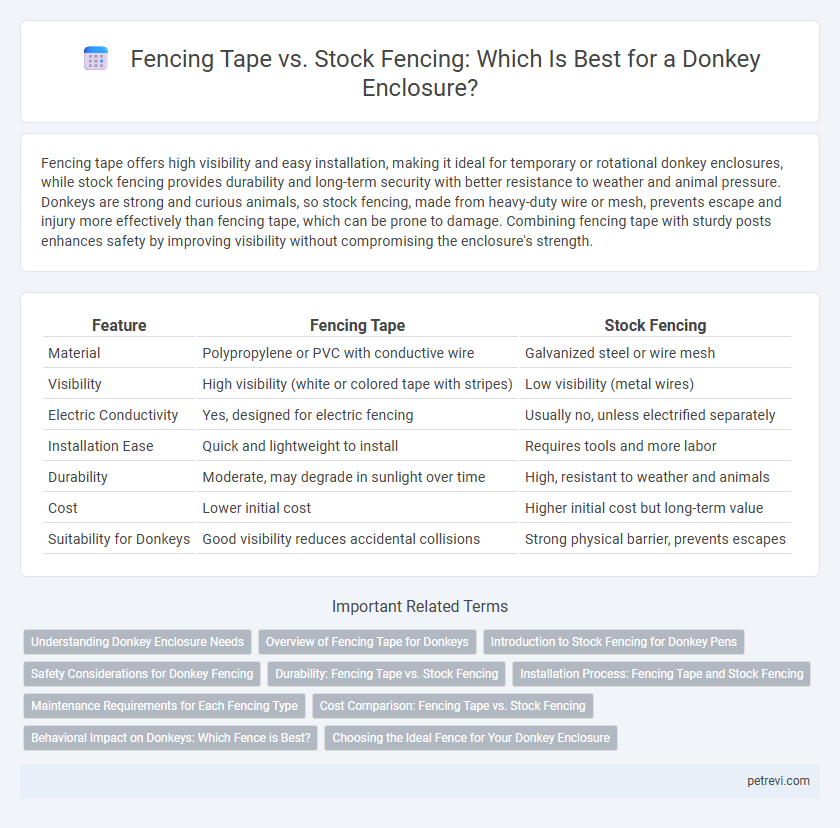Fencing tape offers high visibility and easy installation, making it ideal for temporary or rotational donkey enclosures, while stock fencing provides durability and long-term security with better resistance to weather and animal pressure. Donkeys are strong and curious animals, so stock fencing, made from heavy-duty wire or mesh, prevents escape and injury more effectively than fencing tape, which can be prone to damage. Combining fencing tape with sturdy posts enhances safety by improving visibility without compromising the enclosure's strength.
Table of Comparison
| Feature | Fencing Tape | Stock Fencing |
|---|---|---|
| Material | Polypropylene or PVC with conductive wire | Galvanized steel or wire mesh |
| Visibility | High visibility (white or colored tape with stripes) | Low visibility (metal wires) |
| Electric Conductivity | Yes, designed for electric fencing | Usually no, unless electrified separately |
| Installation Ease | Quick and lightweight to install | Requires tools and more labor |
| Durability | Moderate, may degrade in sunlight over time | High, resistant to weather and animals |
| Cost | Lower initial cost | Higher initial cost but long-term value |
| Suitability for Donkeys | Good visibility reduces accidental collisions | Strong physical barrier, prevents escapes |
Understanding Donkey Enclosure Needs
Stock fencing provides a sturdy and durable barrier capable of withstanding a donkey's strength and preventing escapes, making it ideal for long-term enclosures. Fencing tape offers high visibility to donkeys, reducing accidental collisions, but it lacks the physical robustness required to contain larger or more aggressive donkeys securely. Prioritizing strong, secure materials like stock fencing addresses the specific behavioral traits and physical power of donkeys, ensuring their safety and effective enclosure management.
Overview of Fencing Tape for Donkeys
Fencing tape for donkeys offers visibility and flexibility, making it ideal for temporary or adjustable enclosures. Its lightweight design reduces the risk of injury while providing effective containment for donkey enclosures. This tape is often electrified to enhance security and prevent donkeys from pushing through the boundaries.
Introduction to Stock Fencing for Donkey Pens
Stock fencing, typically made from woven wire or wooden rails, offers durable and secure enclosures ideal for donkeys, preventing escape and protecting them from predators. Its robust design withstands donkeys' strength and reduces the risk of injury compared to flimsy fencing tape. Installing stock fencing ensures a long-lasting boundary that supports the animals' natural behavior and provides a safe environment.
Safety Considerations for Donkey Fencing
Fencing tape provides high visibility, reducing the risk of donkeys injuring themselves by running into the fence, making it a safer option for enclosure boundaries. Stock fencing offers strength and durability but may pose injury risks due to sharp edges or gaps where donkeys can get caught or tangled. Prioritizing materials with smooth finishes, proper height, and regular maintenance ensures optimal safety in donkey fencing solutions.
Durability: Fencing Tape vs. Stock Fencing
Fencing tape offers moderate durability, suitable for temporary donkey enclosures but prone to wear and breakage under strong weather conditions or impact. Stock fencing, typically made of galvanized steel or high-tensile wire, provides superior strength and long-lasting resistance to damage from donkeys pushing or rubbing against it. For permanent enclosures, stock fencing ensures greater durability and security, reducing maintenance needs compared to fencing tape.
Installation Process: Fencing Tape and Stock Fencing
Fencing tape installation is quick and user-friendly, typically requiring only posts and insulators, making it ideal for temporary or movable donkey enclosures. Stock fencing demands more labor and equipment for post setting and wire tensioning, but provides a sturdier and longer-lasting barrier for donkeys. Both methods require secure anchoring, but fencing tape offers easier adjustments and maintenance compared to the rigid structure of stock fencing.
Maintenance Requirements for Each Fencing Type
Fencing tape requires regular inspection to ensure the electrified strands remain intact and properly tensioned, as any damage or sagging can compromise the donkey enclosure's security. Stock fencing demands periodic repairs for wooden posts and wire mesh, with potential rust or rot issues increasing maintenance effort and costs. Overall, fencing tape offers lower maintenance intensity but necessitates vigilance to uphold electrical functionality, whereas stock fencing involves more physical upkeep but provides a durable barrier.
Cost Comparison: Fencing Tape vs. Stock Fencing
Fencing tape for donkey enclosures typically costs between $50 to $150 per 100 yards, offering a budget-friendly and quick-to-install option, while stock fencing can range from $200 to $600 or more depending on wire type and height, representing a higher upfront investment. Maintenance costs for fencing tape tend to be lower due to its ease of replacement and repair, whereas stock fencing often requires more labor and materials over time to maintain structural integrity. Considering total cost of ownership, fencing tape is generally more economical for smaller enclosures or temporary setups, while stock fencing suits long-term durability despite the higher initial expense.
Behavioral Impact on Donkeys: Which Fence is Best?
Fencing tape offers high visibility that reduces stress and discourages donkeys from testing boundaries, promoting safer enclosure behavior. Stock fencing provides durability and physical barrier strength but may cause frustration or injury if donkeys attempt to push through. For optimal behavioral impact, fencing tape combined with a sturdy support structure balances visibility and security, fostering calm and contained donkeys.
Choosing the Ideal Fence for Your Donkey Enclosure
Fencing tape offers high visibility and flexibility, making it ideal for safe donkey enclosures where preventing injury is a priority. Stock fencing provides durability and security with its strong wire mesh, effectively containing donkeys and deterring predators. Prioritize fence height of at least 4 feet and consider electric fencing options integrated with tape or stock fencing for enhanced containment and safety.
Fencing Tape vs Stock Fencing for Donkey Enclosure Infographic

 petrevi.com
petrevi.com